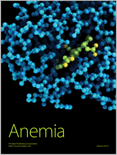
Anemia
Scope & Guideline
Bridging the gap between discovery and clinical practice in blood health.
Introduction
Aims and Scopes
- Epidemiology and Prevalence Studies:
The journal extensively covers studies that assess the prevalence and risk factors of anemia across different populations, including children, pregnant women, and specific ethnic groups. - Genetic and Molecular Research:
Research focusing on the genetic underpinnings of anemia, such as sickle cell disease and thalassemia, is a significant area, exploring genotype-phenotype correlations and the implications of genetic variants. - Clinical Management and Therapeutics:
The journal publishes studies on clinical management strategies for anemia, including treatment modalities, blood transfusion practices, and innovative therapeutic targets. - Socioeconomic and Environmental Factors:
The impact of socioeconomic status, nutrition, and environmental factors on anemia prevalence and severity is a core area of interest, emphasizing public health implications. - Quality of Life and Caregiver Impact:
Research examining the quality of life of patients with anemia and the psychosocial effects on caregivers highlights the broader implications of anemia on community health.
Trending and Emerging
- Sickle Cell Disease and Genetic Variants:
Recent publications show a heightened focus on sickle cell disease, particularly in relation to genetic screening and the identification of carriers, signifying an increased awareness and research interest in this area. - Impact of Gut Microbiota:
Emerging research is exploring the role of gut microbiota in the management of sickle cell disease and its complications, highlighting a novel therapeutic target that may reshape treatment approaches. - Anemia in Pediatric Populations:
There is a noticeable increase in studies addressing anemia in children, particularly in low-resource settings, indicating a growing recognition of its public health implications. - Quality of Life Assessments:
Research focusing on the quality of life of patients with anemia and their caregivers is gaining traction, reflecting a broader understanding of the psychosocial impacts of the disease. - Cross-Sectional and Facility-Based Studies:
An increase in cross-sectional studies assessing the prevalence and associated factors of anemia in various populations suggests a trend towards more localized and context-specific research.
Declining or Waning
- Iron Overload Studies:
Research focused on iron overload, particularly in thalassemia and sickle cell disease patients, appears to be less frequently addressed in recent publications, possibly due to a saturation of existing knowledge. - Orofacial Manifestations of Anemia:
Studies related to the orofacial manifestations associated with anemia, although significant, have not been a focal point in recent issues, indicating a declining interest in this niche area. - Aplastic Anemia Research:
Research on acquired aplastic anemia is less prominent, suggesting a shift in focus towards more prevalent forms of anemia and their management. - Micronutrient Deficiencies:
While micronutrient deficiencies are still relevant, specific studies solely focusing on this aspect of anemia have decreased, as the broader context of anemia is increasingly emphasized.
Similar Journals

CLINICAL HEMORHEOLOGY AND MICROCIRCULATION
Advancing the Science of Blood Flow and MicrocirculationClinical Hemorheology and Microcirculation, published by IOS Press, is a distinguished journal dedicated to advancing the scientific understanding of blood flow mechanics and microcirculatory phenomena. Since its inception in 1991, the journal has been pivotal in bridging the fields of cardiology, hematology, and physiology, as evidenced by its placement in the Q3 quartile across several categories in 2023. Positioned in the vibrant academic landscape of the Netherlands, Clinical Hemorheology and Microcirculation offers valuable insights to researchers and practitioners alike, enriching their knowledge and fostering innovation in clinical practices. With an ISSN of 1386-0291 and an E-ISSN of 1875-8622, the journal serves as a vital platform for disseminating high-quality research and reviews that explore the intricate dynamics of blood viscosity and microvascular function, essential to both health and disease. As readers delve into the journal, they will access rigorous studies that not only enhance theoretical understanding but also pave the way for potential clinical applications, making it a crucial resource for those invested in the future of cardiovascular and hematological research.
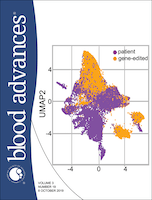
Blood Advances
Innovating Blood Science for a Healthier FutureBlood Advances is a premier, peer-reviewed journal published by Elsevier, dedicated to the field of hematology. With an impressive impact factor and classified within the Q1 category of hematology for 2023, it ranks as the 16th out of 137 journals in the Scopus Medicine Hematology category, placing it in the top 88th percentile globally. This influential journal, which has been disseminating invaluable research since its inception in 2017, focuses on advancing knowledge and innovation in blood science, including clinical and laboratory aspects of hematology. Although it offers limited open access features, its comprehensive scope encompasses various topics relevant to both researchers and practitioners. Located in the United States and managed from Amsterdam, Blood Advances provides a vital platform for the dissemination of groundbreaking research, making significant contributions to the understanding and treatment of blood disorders. Researchers, professionals, and students alike will find this journal an essential resource for keeping abreast of the latest developments and advancements in hematology.

BLOOD REVIEWS
Advancing the frontiers of Hematology and Oncology.BLOOD REVIEWS is a highly regarded journal published by Churchill Livingstone, specializing in the fields of Hematology and Oncology. With an impressive Q1 ranking in both disciplines and placing in the top 10% of its peer categories according to Scopus metrics, it provides an essential platform for the dissemination of cutting-edge research and reviews pertaining to blood disorders and cancer treatment. Since its inception in 1987 and continuing through 2024, the journal has established itself as a cornerstone for healthcare professionals, researchers, and students who seek to advance their understanding of hematologic and oncologic topics. While not an open-access journal, BLOOD REVIEWS retains a reputation for delivering high-quality, peer-reviewed articles that foster dialogue and innovation within the scientific community. For those in the United States and beyond, the journal serves as a vital resource, housed at the Journal Production Department in Edinburgh, Scotland, ensuring accessibility and a global reach in its critical academic contributions.
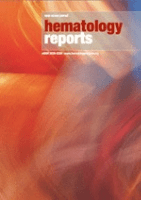
Hematology Reports
Exploring breakthroughs in blood health.Hematology Reports is an esteemed academic journal in the field of hematology, dedicated to advancing the understanding of blood disorders and their treatment. Published by MDPI, a leading Swiss publisher known for its commitment to open access since 2009, this journal provides a valuable platform for researchers and healthcare professionals to disseminate innovative findings and foster collaboration within the academic community. The journal features an array of articles ranging from clinical studies to laboratory research, and is indexed in Scopus, where it currently holds a rank of 113 out of 137 in the Medicine - Hematology category, placing it in the 17th percentile. As an open-access journal, Hematology Reports ensures that critical research is accessible to a global audience, supporting the dissemination of knowledge that has the potential to improve patient outcomes. This journal is an essential resource for those engaged in the study and treatment of hematological conditions, encouraging dialogue and the exchange of ideas to enhance clinical practices.
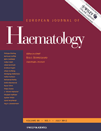
EUROPEAN JOURNAL OF HAEMATOLOGY
Innovative Insights into Blood Health and DiseaseEUROPEAN JOURNAL OF HAEMATOLOGY, published by Wiley, serves as a vital resource for experts in the field of hematology, focusing on the latest advancements in blood disorders and therapies. With an ISSN of 0902-4441 and an E-ISSN of 1600-0609, this esteemed journal has been disseminating knowledge since 1986 and continues to thrive, converging its visionary approach through to 2024. Notably, it holds a distinguished Q2 ranking in Hematology and an impressive Q1 ranking in the broader category of Medicine (miscellaneous) as of 2023, highlighting its significant contribution to the scientific community. With a Scopus rank of #45/137 and a 67th percentile in the field, the journal is recognized for its rigorous peer-reviewed research, making it an indispensable publication for researchers, practitioners, and students aiming to stay at the forefront of hematological studies. Though not an open-access journal, it ensures broad accessibility to critical findings via its subscription model, thus fostering an informed and globally engaged audience.
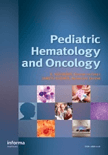
PEDIATRIC HEMATOLOGY AND ONCOLOGY
Championing excellence in pediatric medical advancements.Pediatric Hematology and Oncology, published by Taylor & Francis Inc, serves as a vital platform dedicated to the fields of hematology, oncology, and pediatrics, providing a comprehensive avenue for the dissemination of scholarly research and clinical advancements. With an ISSN of 0888-0018 and an E-ISSN of 1521-0669, this journal has successfully converged its expertise over the years from 1984 to 2024. Ranked in the Q3 category for Hematology and Oncology, alongside a Q2 ranking in Pediatrics, Perinatology, and Child Health (2023), it engages a diverse readership comprising researchers, healthcare professionals, and students eager to explore groundbreaking studies in child health and treatment methodologies. While it currently does not offer Open Access options, the journal is widely cited and recognized, particularly in its specialized fields, fostering a rich environment for dialogue and innovation in the management of pediatric hematological and oncological disorders. The journal is based in the United Kingdom at 530 Walnut Street, Ste 850, Philadelphia, PA 19106, making it an essential resource for those pursuing excellence in pediatric medical research.

INTERNATIONAL JOURNAL OF HEMATOLOGY
Championing Excellence in Hematology ResearchThe INTERNATIONAL JOURNAL OF HEMATOLOGY, published by SPRINGER JAPAN KK, serves as a critical platform for advancing research in the field of hematology. With a prestigious history spanning over three decades from 1991 to 2024, this journal is recognized for its impactful contributions, evidenced by its Q2 category ranking in Hematology for 2023, and its notable position at rank #71 out of 137 in the Scopus Medicine Hematology category. Researchers and professionals within the hematology community benefit from the journal's rigorous peer-reviewed articles that cover a wide range of topics, including clinical studies, basic research, and novel therapeutic strategies. Though currently non-open access, it provides essential insights and findings to an audience passionate about the latest advancements in blood disorders and treatments. Situated in Japan, the journal not only showcases high-quality research but also fosters a global exchange of knowledge in hematology, making it a significant resource for scholars, practitioners, and students alike.

Hematologie
Advancing the Science of Blood DisordersHematologie is a highly regarded journal in the field of hematology, published by JOHN LIBBEY EUROTEXT LTD. With an ISSN of 1264-7527 and an E-ISSN of 1950-6368, this journal has established itself as a vital resource for researchers, clinicians, and students dedicated to advancing the understanding of blood disorders and treatments. Although the journal's coverage in Scopus was discontinued in 2018, it has continually provided invaluable insights and research findings. The journal aims to foster knowledge sharing and discussion in hematology, exploring innovative methodologies and emerging trends in the field. With a commitment to quality research, Hematologie remains an essential platform for disseminating critical findings that can drive clinical practice and influence future studies in hematological sciences.

Journal of Blood Medicine
Exploring Frontiers: Where Blood Medicine Meets Cutting-edge ScienceThe Journal of Blood Medicine, published by DOVE MEDICAL PRESS LTD, stands as a vital resource in the field of hematology, focusing on the latest research developments and clinical advancements in blood medicine. With an impact factor reflective of its growing relevance, this open-access journal has been delivering quality scholarly work since 2010, ensuring that critical research is readily available to the global scientific community. The journal operates under an open-access model, further enhancing its dissemination and accessibility to researchers, professionals, and students alike. In the 2023 rankings, it secured a Q3 category status within hematology and achieved a commendable 76th rank out of 137 in Scopus listings, indicating its commitment to quality and innovation in this specialized area. Located in New Zealand, the journal's diverse topics encompass clinical research, treatment modalities, and emerging therapies, contributing significant insights vital for shaping future advancements in blood medicine.
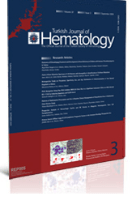
Turkish Journal of Hematology
Pioneering insights into blood disorders and treatments.Turkish Journal of Hematology is an esteemed publication dedicated to advancing the field of hematology, producing influential research since its inception in 1999 under the auspices of GALENOS PUBL HOUSE. With an Open Access model, it facilitates widespread dissemination of knowledge, allowing researchers, clinicians, and students to stay abreast of the latest developments in blood disorders and treatments. With an ISSN of 1300-7777 and an E-ISSN of 1308-5263, the journal holds a commendable position in the academic community, evidenced by its 2023 Q3 ranking within the hematology category and its standing at #80 out of 137 in the Scopus database, placing it in the 41st percentile. Covering a wide scope of topics within hematology, this journal serves as a critical resource for disseminating innovative research and clinical practices pertinent to the ongoing challenges faced in this vital area of medicine. With its continuous publication until 2024, Turkish Journal of Hematology remains a beacon for enhancing the understanding and treatment of hematological conditions within the Turkish and global medical communities.